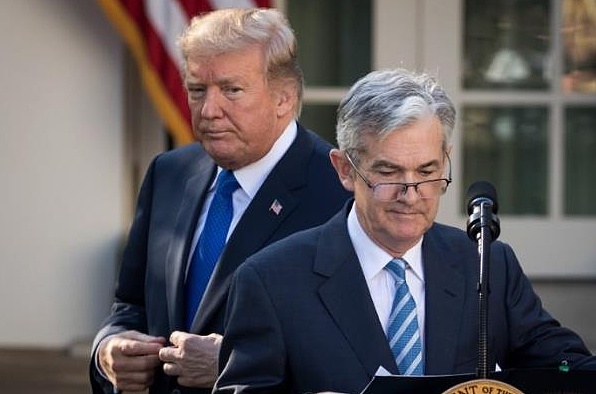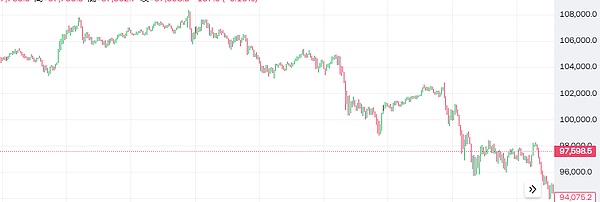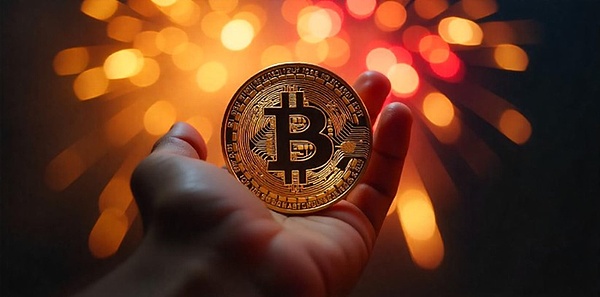Author: Bitke Editor: Daheilong
When Satoshi Nakamoto launched Bitcoin, he probably didn't expect that this "spark" would have such a "wildfire" trend.
From 1 bitcoins being only enough to buy two pizzas, to 1 bitcoin breaking through 10 US dollars, there shouldn't be too many objections to saying that Bitcoin is "digital gold". However, for the Bitcoin community, the price increase does not really reflect its true value, and as some countries try to start a strategic reserve of Bitcoin, it has attracted global attention, and people have to start looking at this initially unknown digital currency differently.

Fed Chairman Hard Against Trump?
There is a debate about whether the incoming Trump administration will establish a Bitcoin reserve. Trump's previous comments suggested that he plans to establish a Bitcoin strategic reserve similar to the US Strategic Petroleum Reserve.
Fed Chairman Powell said at a press conference this week that the Fed has no intention of holding Bitcoin. "We are not allowed to hold Bitcoin," Powell said at a press conference after the FOMC meeting. As for the legal issues of holding Bitcoin, Powell said, "This is something for Congress to consider, but we have no intention of seeking to change the law."
The reason why the Fed is cautious about the path of interest rate cuts next year is because it is worried that the Trump administration's potential tariff policy will trigger the risk of upward inflation. The result is also obvious - Bitcoin continued to fall in European trading on Friday and once approached $95,000, while earlier, Bitcoin had just hit a record high of more than $108,000.

The US exchange-traded fund (ETF) that directly invests in Bitcoin ended its 15-day inflow of funds, setting a record of $680 million in outflows, highlighting the shift in market sentiment. Strahinja Savic, head of data and analysis at FRNT Financial, said it was "very typical" to see such a pullback in the cryptocurrency bull market, while QCP Capital said in a report that the root cause of the sell-off was the market's "overly optimistic" positions. The Federal Reserve's hawkish turn on Thursday weighed on most risk assets. Bitcoin prices are still up nearly 50% since pro-crypto Donald Trump won the U.S. presidential election on Nov. 5. "It looks like investors are taking profits at the end of the year, and there are no fundamental factors that triggered the sell-off," said Edward Chin of Parataxis. With fewer expectations of a Fed rate cut in 2025, some investors may be choosing to reduce their exposure and take profits. Chris Weston, head of research at Pepperstone Group, wrote in a report, "Technically, caution is appropriate in the short term. This does not mean that we will see a price crash soon, but the momentum of the rally has clearly weakened and buyers have lost dominance and control of the market." Which countries are going to launch strategic Bitcoin reserves?
In fact, as Trump "officially" supports Bitcoin and claims to establish a strategic reserve of Bitcoin, some countries have begun to move. Bitkoala Koala Finance is sorted out as follows:
1. United States: Wyoming Senator Cynthia Lummis proposed a bill called the "Bitcoin Act" last spring, which proposed that the United States purchase up to 200,000 Bitcoins per year for five years, or 5% of the total supply of the token. Bitcoin will be stored in a "decentralized secure Bitcoin vault network operated by the U.S. Treasury," and token acquisition will be completed through the diversification of existing Federal Reserve funds such as bonds, loans and gold.
In addition, at the state level in the United States, the establishment of Bitcoin reserves is also underway. For example, a Texas lawmaker last week introduced a bill proposing that the state establish a Bitcoin reserve and hold it for at least five years; at the same time, Pennsylvania proposed a similar bill in November. 2. Russia: According to the Russian state news agency Ria, several Russian lawmakers proposed to establish a "cryptocurrency reserve" in the "treasury" in November last year, but were opposed by Anatoly Aksakov, chairman of the Russian State Duma Committee. But just one month later, Russian parliamentary representative Anton Tkachev again proposed to establish a national Bitcoin reserve. 3. Japan: Japanese lawmaker Satoshi Hamada submitted a formal request to the legislature in December, hoping to discuss the establishment of a national Bitcoin reserve in Japan.
4. Poland:Polish presidential candidate Sławomir Mentzen advocates the establishment of a strategic Bitcoin reserve and the adoption of cryptocurrency-friendly laws and regulations in Poland. He said: "If I become president of Poland, our country will become a haven for cryptocurrencies, with very friendly regulations, low tax rates, and supportive attitudes from banks and regulators."
5. Brazil:The Brazilian government has proposed a bill proposing the establishment of a national Bitcoin reserve. According to the proposed legislation submitted, the Bitcoin Sovereign Strategic Reserve (RESBit) will account for 5% of Brazil's international reserves. Its goal is to diversify the assets of the Brazilian Treasury.
6. El Salvador:On-chain data shows that the Salvador wallet address purchased 11 bitcoins worth $1.07 million for its strategic Bitcoin reserve. This news was confirmed by the Bitcoin Office of El Salvador, who stated that they had transferred $1 million worth of BTC to El Salvador's strategic Bitcoin reserve.

Why are more and more countries launching Bitcoin strategic reserves?
There are multiple complex reasons and considerations behind launching Bitcoin strategic reserves. We can analyze it from the following aspects:
1. Economic diversification and financial sovereignty
Hedge against inflation risk:Traditional fiat currencies face the risk of inflation. In contrast, the total amount of Bitcoin is limited and has decentralized characteristics. In theory, it is not easily affected by excessive government printing of money. Therefore, it is regarded as a tool to hedge against inflation risk. The value of Bitcoin may continue to grow over time and can be used as a means of long-term value storage.
Enhance financial sovereignty:The traditional financial system is often controlled by a few large financial institutions, and the monetary policies of various governments are also affected by international financial organizations. By holding Bitcoin, countries can reduce their dependence on the traditional financial system and reduce the constraints of other countries' economic policies. To a certain extent, Bitcoin can give countries more financial autonomy and give them a greater voice in the international financial system.
Attract investment:Including Bitcoin in strategic reserves can send a positive signal to the market, indicating that the government supports the development of digital assets, which will attract more investors and enterprises to enter the country's digital asset market, thereby promoting the prosperity of the digital asset industry. The development of the digital asset industry can create more jobs and promote economic growth.
2. Enhance international image
Avoid sanctions risks:When international relations are tense, governments often impose financial sanctions on each other, freeze assets, and restrict transactions. As a decentralized digital currency, Bitcoin has a high degree of anonymity and can circumvent sanctions from the traditional financial system. By holding Bitcoin, countries can transfer part of their assets to the field of digital assets that are not easily frozen, thereby protecting national wealth.
Improve international image:The field of digital currency is an emerging frontier of science and technology, attracting more talents and technologies, which will help improve the country's scientific and technological innovation capabilities. The layout of Bitcoin can enable a country to take a leading position in the field of digital currency and enhance its influence on a global scale. Showing a positive attitude in the field of digital currency can shape a country's image of openness, innovation, and embracing the future.
3. Enhance financial independence
Get rid of the hegemony of the US dollar:As the world's main reserve currency, the status of the US dollar has a profound impact on the international financial system. By holding Bitcoin, countries can reduce their dependence on the US dollar and enhance financial independence. Bitcoin can be used as a new reserve asset to help countries diversify exchange rate risks.
Part of the future financial system:With the rapid development of the digital economy, the demand for digital assets continues to increase. As the earliest digital currency, Bitcoin is expected to become an important part of the future financial system. Bitcoin can achieve fast and low-cost cross-border payments and is expected to replace the traditional international payment system. Smart contracts based on Bitcoin blockchain technology can achieve more efficient and secure transactions, providing a broad space for financial innovation. Including Bitcoin in strategic reserves can help countries achieve diversified asset allocation and reduce the risk of single assets.
Summary
Bitcoin strategic reserves are a complex issue involving multiple aspects such as economy and finance. It should be noted that there are also certain risks in Bitcoin strategic reserves. For example, the sharp fluctuations in Bitcoin prices may bring uncertainty to national finances; in addition, the global supervision of digital assets is still imperfect, there may be legal risks, and Bitcoin technology itself is also constantly developing, there may be security risks.
In fact, different countries have different motivations and considerations for launching strategic Bitcoin reserves, but generally they all hope to respond to the challenges of the traditional financial system, enhance national competitiveness, and prepare for the future financial landscape through this method.
 Brian
Brian
 Brian
Brian Brian
Brian Kikyo
Kikyo Alex
Alex Kikyo
Kikyo Brian
Brian Alex
Alex Alex
Alex Joy
Joy Brian
Brian